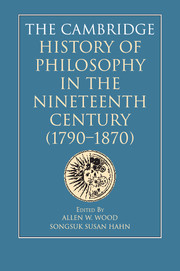Book contents
- Frontmatter
- Contents
- Contributors
- Preface
- Abbreviations
- Introduction
- I Philosophy in the Nineteenth Century
- II Logic and Mathematics
- III Nature
- IV Mind, Language, and Culture
- V Ethics
- 12 Autonomy and the Self as the Basis of Morality
- 13 Ethics and the Social Good
- 14 Moral Epistemology, 1788–1870
- 15 Antimoralism
- VI Religion
- VII Society
- VIII History
- References
- Index
- References
14 - Moral Epistemology, 1788–1870
from V - Ethics
Published online by Cambridge University Press: 05 December 2012
- Frontmatter
- Contents
- Contributors
- Preface
- Abbreviations
- Introduction
- I Philosophy in the Nineteenth Century
- II Logic and Mathematics
- III Nature
- IV Mind, Language, and Culture
- V Ethics
- 12 Autonomy and the Self as the Basis of Morality
- 13 Ethics and the Social Good
- 14 Moral Epistemology, 1788–1870
- 15 Antimoralism
- VI Religion
- VII Society
- VIII History
- References
- Index
- References
Summary
The aftermath of the French Revolution forced European thinkers to confront the problem of restoring and preserving social stability. Could a revitalized Christianity ensure that the great mass of the population would not be swept up again in revolutionary fervor? If Christianity could no longer perform the task of teaching contentment with their lot to the disenfranchised and poor, what could do so? The consequences of trying to reform society had proven devastating in France. No one wanted to bring such upheavals upon Europe again. Was every reformist doctrine as dangerous as the doctrine of the rights of man? Or was some sort of reform a price to be paid for the restoration of order?
Revolutions and reform movements during the first two-thirds of the century kept such questions alive. In British and French moral philosophy between the French Revolution and the Franco-Prussian War the question of the role of intuition in providing moral knowledge was a central theme. The recurrent social and political crises of the period help explain why. Those who shaped opinion agreed that general acceptance of Christianity was essential to social stability. Philosophers who took intuition to provide the basis of morality were taken to be supporting religion. Most of those who rejected intuitionism were not. On both sides, the epistemological issue had two parts. One concerned the ultimate justification for moral belief. Almost no one thought morality was wholly a matter of feeling. What rational warrant, then, could it have? The other concerned the extent to which warranted moral beliefs are available to everyone whose conduct they should guide. Can we all think out for ourselves what we ought to do, or must some people – perhaps the majority – take their morals on authority from others?
- Type
- Chapter
- Information
- Publisher: Cambridge University PressPrint publication year: 2012



